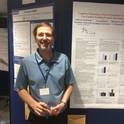Presentation
Subtleties of Grammar-Cued Aspect: Cognitive Evidence from Native and Non-Native Speakers
3rd Conference of the International Society for the Linguistics of English
(2014)
Abstract
The role of morphosyntactic aspect in theories of grammar (Givon, 1995; Kintsch 1995) and in theories about awareness, or consciousness, in learning (Leow, 2000; Williams, 2005) is unclear. Consequently, experimental psycholinguistic investigations in discourse processing and text comprehension by native speakers of English have largely focused on nongrammatical questions (Schmid, 2012). This is especially true for research into coherence inferences in text comprehension (McNamara & Magliano, 2009). The prominent focus has been on so-called "vocabulary-guided" or "knowledge-driven" comprehension processes. The role in processing and comprehension of language forms studied on the morphosyntactic level has been neglected. Some proposals are available to redress this imbalance (Givon, 1995; Kintsch, 1995). A dual parallelprocessing mechanism consisting of a fast, rough-grained, weak, and relatively context-independent grammatical and a slow, finegrained, strong, and context-dependent lexical channel has been proposed: grammatical forms have the function of giving mental processing instructions. English aspect is a semantic domain expressed precisely through this grammatical channel. Similarly, more research into aspect comprehension by learners of English is needed (Bardovi-Harlig, 2000). Presumably partially because of the nature of the grammatical channel and partially because of the semantic complexity of aspect, its comprehension and concurrent pragmatic inferences pose a formidable challenge for learners even at higher proficiency levels, where the production of aspect is fairly sophisticated. In this study, a hybrid design to gather moment-to-moment data at the processing and offline data at the mental-representation stage was used to test the effect of English aspect on memory. 48 native speakers were selected to investigate attentional profiles. Their profiles were compared to those of 25 Saudi-Arabian advanced adult learners. Narratives were designed such that if meanings are activated moment-to-moment because of causal bridging inferences (Zwaan, Magliano & Graesser, 1995) during reading and if meanings are available offline later, this may be taken as indication of comprehension. The temporal properties of perfective (Simple Past) and imperfective (Past Progressive) aspect were used to manipulate causality between telic and following situations. 16 narratives were presented in two versions— perfective and imperfective. Stories were designed so readers would infer causal relations because of temporal contiguities (van den Broek, 1990). The temporal properties of perfective aspect were used to reduce the strength of causal links between telic 2-state (asserted time includes post time of source state) and following situations, those of the imperfective to increase causality (asserted time is fully located within source state of 2-state situations) (Klein, 1994). Moment-to-moment comprehension was tested using a wordcompletion task involving objects from causal-antecedent predicates in which aspect was manipulated, off-line comprehension through written answers about antecedents. Statistical analyses show a significant main effect of (non)nativeness: learners did not comprehend aspect differentially. T-tests investigating native speakers' aspect comprehension provide evidence that the imperfective increased the availability of antecedents for causal inferencing in both memories. It also appears aspectual information from the grammatical channel was available in memory differentially during processing and is thus context-dependent. Implications of the results for cognitive grammars (Hamblin & Gibbs, 2003) and for learning English are discussed.
Disciplines
Publication Date
2014
Location
Zurich, Switzerland
Citation Information
Andreas Schramm. "Subtleties of Grammar-Cued Aspect: Cognitive Evidence from Native and Non-Native Speakers" 3rd Conference of the International Society for the Linguistics of English (2014) Available at: http://works.bepress.com/andreas-schramm/14/
